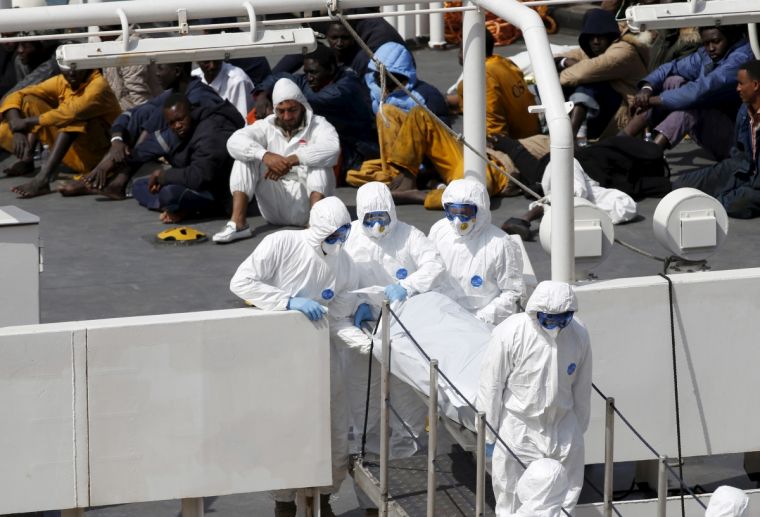Prosecutors blame captain for causing deaths in migrant shipwreck

Prosecutors blamed the Tunisian captain of a fishing boat for causing the deaths of hundreds of migrants locked below decks when his vessel capsized in the Mediterranean, in the weekend shipwreck that has shocked Europe.
Prosecutors said on Tuesday that Mohammed Ali Malek, 27, arrested under suspicion of multiple homicide, had steered his severely overloaded boat into a collision with a merchant ship that was coming to its rescue.
Only 28 survivors have been brought toItaly from the hundreds of mainly African and Bangladeshi migrants on board. Police have quoted the survivors giving death tolls that range from 400 to 950 in what appears to have been the worst disaster ever among migrants fleeing across theMediterranean to Europe.
So few survived because most of the migrants on board, including women and children, had been locked in the hold and lower decks of the three-deck fishing boat, said Catania chief prosecutor Giovanni Salvi.
That also made it impossible so far to reach the bodies and verify the toll.
The captain has been arrested on suspicion of multiple homicide and people-smuggling, and he and his 25-year-old Syrian first mate, Mahmud Bikhit, are also suspected of causing a shipwreck. It was not immediately possible to reach lawyers representing them for comment.
Under Italian law, prosecutors outline the charges they believe a defendant should face before the defendant is formally charged by a judge.
Both men are in police custody, while investigations continue, the prosecutors' office said.
The disaster comes after weeks of a dramatic rise in deaths among migrants packed into rickety vessels to cross the Mediterranean. Nearly 1,800 have drowned so far this year, compared to fewer than 100 deaths by the end of April last year, a period when a similar number attempted the crossing.
That has put new pressure for action on European leaders who restricted funding for naval operations on the argument that rescuing migrants lures more to cross. The policy, still backed by some EU countries, appears to have made the voyage far deadlier without reducing the numbers attempting it.
The number of migrants attempting the dangerous journey usually peaks in the late spring and summer months, adding to the urgency.
The EU proposed on Monday doubling the size of its small naval mission in the area, which replaced a far larger Italian operation cancelled last year. It has summoned leaders of its countries to an emergency summit on Thursday.
The Italian coast guard said 638 migrants were rescued from rubber dinghies on Monday in six separate operations and merchant ships and coast guard patrol boats were assisting a fishing boat carrying migrants some 80 miles off the south eastern coast of Calabria, in mainland Italy.
Lawlessness in Libya, where most of the migrant boats originate, has made it difficult to prevent traffickers from packing thousands of people fleeing poverty or war into unsafe fishing boats and rubber dinghies.
The prosecutors' office said it was possible that investigators would try to recover the wreck of the vessel, which sank around 70 nautical miles off the Libyan coast at around midnight between Saturday and Sunday.
According to the prosecutors, the fishing boat was so heavily overloaded that it could not be manoeuvred properly. The captain crashed it into the King Jacob, a Portuguese merchant vessel that had approached to give aid.
As around 100 migrants on deck rushed to one side, the boat capsized and sank.
The Catania prosecutors office said no blame was attached to the merchant ship.











